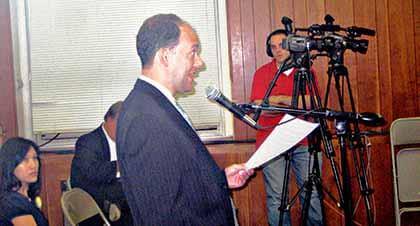By Howard Koplowitz
Queens residents got a chance for their voices to be heard on what questions they believed should be posed to voters on the November ballot as the City Charter Revision Commission held a public hearing last week at Borough Hall.
The commission decides which questions make it onto the ballot — items that may change the Charter, the government’s foundational document, which is the city’s equivalent of the U.S. Constitution.
Some topics that might make the ballot include questions on term limits, the roles of borough presidents and community boards and non-partisan elections.
Borough President Helen Marshall advocated for borough presidents to get guaranteed baseline funding.
“Currently, we don’t have the resources to do our Charter-mandated duties,” she told the commission.
Marshall also said the commission should look at strengthening the roles of community boards and borough presidents, who some have suggested are unnecessary positions.
On term limits, Marshall said she supported three four-year terms for city elected officials, a change the City Council enacted to much controversy last year.
“To push projects through, it takes a long time,” she said.
She also said she was against nonpartisan elections because that proposal “enables the rich to benefit and disenfranchises everyone else.”
“Our party positions are more than labels,” Marshall said.
Commission members discussed some of the proposals among themselves before about three hours before hearing the public, which led to frustration among some who attended who were seen leaving early.
Queens Civic Congress President Pat Dolan told the commission that the group, a conglomeration of civics across Queens, is in favor of two two-year terms for city elected officials and that a voter referendum be the only way to change those terms.
The group, which held a public hearing on Charter revision last month, was also opposed to non-partisan elections.
Commission member Anthony Perez Cassino recommended the Council become a full-time body and that Council members be subject to more precise salary ranges on their financial disclosure reports for outside income.
“The public’s entitled to know,” he said.
Cassino also said the Council should do away with lulus, stipends given to committee chair people — 46 of the 51 members of the Council head committees — and distribute member items more fairly.
But commission member Steve Fiala said “anger” with the system “is not a sufficient reason to take draconian measures.”
Commission member John Banks said lulus and member items are needed because horse-trading in politics builds coalitions to get legislation passed.
“If you cannot do that, you will lose the ability to build consensus on any issue,” he said.
Councilman Dan Halloran (R-Whitestone) told the commission, which expects to release its final report next week, that he believes the body does not have enough time to thoroughly review topics it discusses and recommended that no items be put on the ballot for November.
Reach reporter Howard Koplowitz by e-mail at hkoplowitz@cnglocal.com or by phone at 718-260-4573.



































